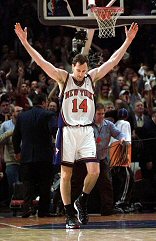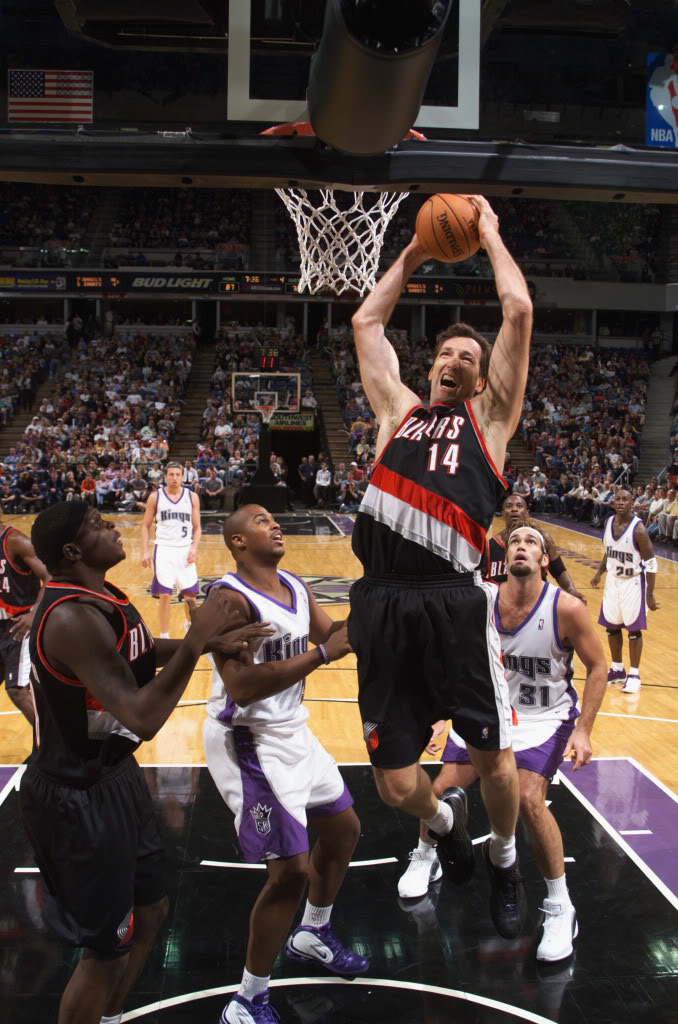By Roy Collins

Chris Dudley played basketball in the NBA for 16 years. The Yale graduate gained notoriety around the league as a voracious defender, energetic rebounder, and formidable shot blocker. He played Center as a member of the Cleveland Cavaliers, the New Jersey Nets, Portland Trail Blazers, New York Knicks, and the Phoenix Suns.

Dudley was born in Connecticut, but grew up primarily in the San Diego area of California where he started playing basketball. A bit of a late bloomer, Dudley played Junior Varsity basketball through his junior year of high school when he was first diagnosed with diabetes at the age of 16. Committing to Yale University during his senior year, Chris Dudley played for the Bulldogs from 1983 to 1987 before becoming the first ever Type-1 Diabetic to play in the NBA when we was drafted by the Cleveland Cavaliers in the fourth round of the 1987 draft.

Dudley's professional career
achievements include playing in a total of 886 games, scoring 3,473 points, 375 assists, 1,027 blocked shots, and 5,457 rebounds. The NBA rewarded Dudley with the J. Walter Kennedy Citizenship Award in 1996, and USA Today named him the Most Caring Athlete in 1997.
I was fortunate enough to interview Chris Dudley about his experience playing basketball as a type-1 diabetic.
It was in his spring semester in 1981 after his sophomore year that Chris Dudley started to experience the classic symptoms of increased thirst and frequent trips to the bathroom. His close uncle had diabetes, so after advising Dudley and his dad to test his blood glucose level (BS) at a home test kit from the local pharmacy, he realized he had T1D.
Initially shocked, Dudley remembered that the life expectancy for diabetics was well below that of non-diabetics in the early 80's. Nearly as important to the 16-year-old was the question of whether or not he would be able to keep playing basketball.
 Lucky for Dudley two main factors kept his spirits high in this tumultuous time. One, his endocrinologists in San Diego were fairly progressive in that knew the value of athletics in maintaining steady glucose levels. Although not a lot had been confirmed in this time as it related to the effect on sports and diabetes, his doctors did not deter Dudley from continuing to play. Second, Dudley looked to National Hockey League star Bobby Clarke for inspiration. Bobby Clarke was drafted into the NHL in 1969 as a diabetic, ultimately winning two Stanley Cup Championships and being inducted into the Hall of Fame in 1987. Clarke inspired confidence in Dudley that achieving athletic success was possible for a type 1 diabetic.
Lucky for Dudley two main factors kept his spirits high in this tumultuous time. One, his endocrinologists in San Diego were fairly progressive in that knew the value of athletics in maintaining steady glucose levels. Although not a lot had been confirmed in this time as it related to the effect on sports and diabetes, his doctors did not deter Dudley from continuing to play. Second, Dudley looked to National Hockey League star Bobby Clarke for inspiration. Bobby Clarke was drafted into the NHL in 1969 as a diabetic, ultimately winning two Stanley Cup Championships and being inducted into the Hall of Fame in 1987. Clarke inspired confidence in Dudley that achieving athletic success was possible for a type 1 diabetic.
Most diabetics typically receive their insulin through two methods: multiple injections via an insulin pen or syringe, or through an insulin pump. Through the bulk of Dudley's career, he received his insulin through multiple injections, as pump use had not been as highly advertised until the early 2000's. Dudley commented that he wears the pump to receive his insulin currently, and would have considered wearing the modern day pumps back in his playing days, had they been available.
Other than his impressive doctors

back in San Diego, Chris Dudley credits a particular nurse, Molly Meyer (who worked at Yale where Chris played in college) as incredibly instrumental in helping him out to manage his diabetes when it was most important and the level of play was at its highest. When asked about the most important person who currently helps Dudley the most with his diabetes management, he notes that his wife, also named Chris, is responsible for keeping him on top of his health.
Exercise of any kind with diabetes can be arduous. Playing basketball at the highest level for 16 seasons certainly presented unique challenges for Chris Dudley. When I asked him what the hardest aspects of his career were, he spoke about all the spikes in bis blood sugar from adrenaline he experienced, playing night after night in front of ten of thousands of screaming fans. The schedule of an NBA player also presents plenty of variables that may affect his glucose level management, from altitude of certain cities to back-to-back games on the calendar. The lag time for insulin in the 1990's was also closer to 45 minutes, rather than the 15 to 20 minute absorption rate diabetics are blessed with today. This meant Dudley had to operate with a tremendous amount of foresight to try and keep optimum BS levels for game time.
I asked Dudley to share with me his average game day
schedule, including testing times, in order to get a better sense on how regimented an NBA player with diabetes' agenda must be.
Assuming the game was at home:
- Dudley would wake up and test
- Eat Breakfast
- Prepare to drive into the arena for a pregame shootaround and test
- Arrive at the arena and test
- Participate in the pregame shootaround and test
- Complete a quick workout, this might include a light lift and/or a solid stretching session, all while testing
- Drive back home and test
- Take a nap, wake up and test
- Eat a balanced meal, chock full of protein
- Relax for a bit and test
- Drive back to the arena for the actual game and test
- Get more shots up, complete pregame workout is necessary to get loose andtest
- Prayer/Mediation in the pregame Chapel and test
- Pregame meeting with the team and test
- Right before game time test
- The Trainer will test (4x) throughout game
- At Halftime test
- After the game, get changed, test, and drive home
- At Bedtime, test
If you're counting at home, that's roughly 20 times a day that Dudley tested his blood sugar. He notes how convenient it would have been to have been playing professional basketball in the Continuous Glucose Monitoring (CGM) era where he could read a continuous plotting of his blood glucose levels.